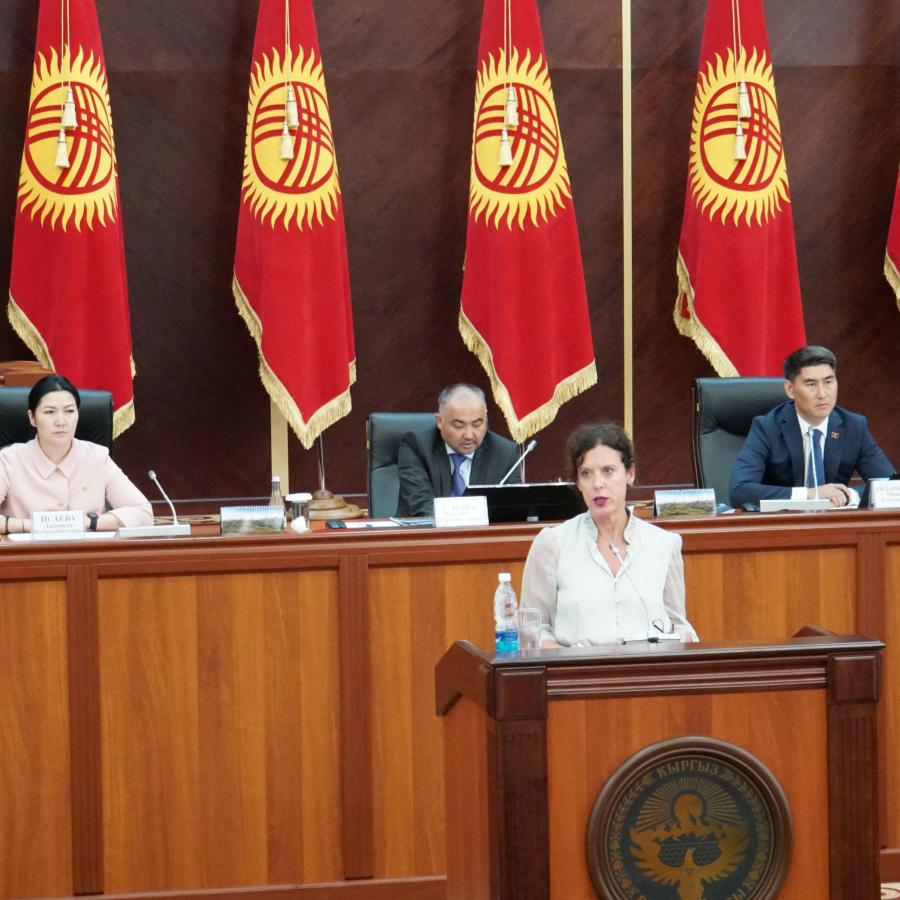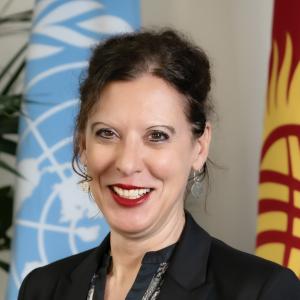Remarks by UNRC Antje Grawe at the Extended Meeting with the Working Group on Monitoring the Implementation of Legislation on the SDGs, Parliamentary Committee on International Affairs, Defense, Security, and Migration
Parliament of the Kyrgyz Republic

Excellency Mr. Nurlanbek Turgunbekovich, Speaker of the Jogorku Kenesh of the Kyrgyz Republic,
Madame Vice Speaker Isaeva,
Dear Chingiz Azamatovich, Chairman of the Parliamentary Committee on International Affairs, Defense, Security, and Migration and its honorable members,
Excellencies, distinguished development partners, civil society, dear UN colleagues,
Let me start by congratulating the organizers of today’s gathering for bringing together Members o Parliament, civil society, media and development partners in such an exemplary way.
On behalf of the United Nations system in the Kyrgyz Republic, I would like to extend my gratitude for the opportunity to address this esteemed gathering today. It is a great privilege to be here with you for a discussion of the vital role which Parliament plays in supporting the implementation of the Sustainable Development Goals (SDGs) in the Kyrgyz Republic, actually in the implementation of Kyrgyzstan’s Sustainable Development Goals.
The SDGs serve as a comprehensive roadmap towards a more sustainable and equitable future for all. They represent a transformative vision of eradicating poverty, safeguarding the planet, and promoting prosperity, peace, and social justice.
However, the success of these ambitious goals hinges upon effective collaboration and meaningful engagement of and at all levels of governance. And you hold a unique position within the governance structure, serving as a crucial link between governments and citizens. By fostering inclusive and participatory processes, you can ensure that the SDGs are not merely lofty aspirations, but tangible realities that positively impact the lives of ordinary people:
First and foremost, Parliaments have the power to translate the global commitments of the SDGs into national legislation and policies. Through your legislative functions, you can enact laws that both align with the principles and targets set forth by the SDGs and that provide an enabling environment for their implementation. Your role in assessing the effectiveness and impact of legislation related to the SDGs is vital in shaping policies and actions that promote sustainable development in line with national priorities.
Second, you oversee the allocation of public funds and you have the ability to influence budgetary decisions. By engaging in robust debates and deliberations, you can shape budgetary policies that prioritize the implementation of the SDGs. You can advocate for adequate funding for sectors such as education, healthcare, infrastructure, clean energy, and poverty alleviation, which are central to Kyrgyzstan’s national development policies and programmes.
Third, through your oversight role, you can identify gaps and obstacles in the implementation of the SDGs, and drive policy adjustments and targeted interventions to accelerate progress.
Last but not least, you are the natural body to serve as platform for dialogue and collaboration among diverse stakeholders, including civil society organizations, businesses, academia, and local communities. By providing spaces for inclusive debates, consultations, and the exchange of ideas, you can harness the collective wisdom and expertise of various actors to generate innovative solutions and foster ownership of the SDGs' implementation.
Dear Members of the Parliament and other participants in today’s meeting,
The Kyrgyz Republic has exhibited a commendable dedication to achieving the SDGs:
The SDGs have been localized and integrated into Kyrgyzstan’s national development policies and strategies. This in itself is extremely important as the SDGs are still too often considered some sort of global construct, which it is not: The SDGs are part and parcel of Kyrgyzstan’s own long term development strategies, as reflected in the National Development Strategy 2040 and the National Development Programme 2026, among other.
In 2020, the Kyrgyz Republic presented its inaugural Voluntary National Review, showcasing its commitment to transparency and accountability.
Kyrgyzstan recently further strengthened its institutional framework to support the implementation of the SDGs with the establishment of the National SDG Coordinating Council, chaired by the Chairman of the Cabinet of Ministers. Additionally, Parliament formed a dedicated Working Group to monitor the implementation of the SDGs. These institutional advancements underscore the country's commitment to effective coordination, collaboration and monitoring in pursuit of the SDGs.
Importantly, Kyrgyzstan made significant progress on several SDGs: Before the pandemic, periodic reviews of the SDGs demonstrated substantial improvements in reducing poverty (SDG1), maternal mortality (SDG3), access to education (SDG4), drinking water (SDG6), electricity (SDG7), and fostering economic growth and job creation (SDG8).
However, the multiple crises of the last three years have severely impacted this positive trajectory, creating hardships for a significant portion of the population.
The latest SDG progress report (published by Economic and Social Commission for Asia and the Pacific – ESCAP in 2022) highlights that several SDGs demand increased attention, particularly to address the impact of climate change and pollution; enhance the quality of education and healthcare; reduce income inequalities, and reinforce food security. The incidence of gender-based violence remains alarmingly high, and the country has witnessed a rise in poverty levels, with approximately one-third of its population now falling below the poverty line. Human rights indicators also point towards a steep downwards trend.
In this context, it is even more important that all efforts are being deployed to reverse the negative trend, in the interest of the Kyrgyz people, including those otherwise excluded from development opportunities.
For the SDGs to be achieved in Kyrgyzstan by 2030 and for the negative trends to be reversed, a whole-of State and a whole-of-society approach is needed where State institutions, the business community, civil society organisations, women groups, youth, media and academia all play their role, collectively and independently.
For this to happen – and here allow me to return to the first role which I mentioned and which is also at the center of today’s discussion: Your legislative role through which you can create an enabling environment for the implementation of the SDGs -
legislation is needed that:
- allows knowledge to flourish;
- enables debates, including controversial debates, to take place to arrive at the best solutions for the country;
- strengthens rather than hinders the implementation capacities of civil society and NGOs to support the State in delivering social services to all 7 million Kyrgyz citizens, without leaving anyone behind – the motto of the SDGs.
In this context, allow me also to use this opportunity to raise my concern, on behalf of the UN system in Kyrgyzstan, that some of the draft legislation currently under discussion risks not to support the achievement of the SDGs. To the contrary, the draft Laws on “Foreign Representatives”, and the “Mass Media” in particular risk to undermine the achievement of the SDGs.
The achievement of the SDGs not only requires close consultations with civil society representatives to respond to the needs of society – it is also very much based on the role of civil society actors as implementing partners of the State and its development partners to deliver essential services to the people.
Civil society organizations’ ability to represent the broad and diverse elements of the people of Kyrgyzstan make them a unique and essential partner, particularly in reaching vulnerable groups.
Limitations on civil society’s capacity to operate effectively may have a detrimental impact on the delivery of important development programs and the government's ability to efficiently utilize nationally executed funds and international financing. It may also hinder the implementation of donor cooperation programmes with the Kyrgyz Republic, including in areas such as health care, education, social services and agriculture affecting climate change, where NGOs play a key role as implementing partners.
In closing, on behalf of the UN Country Team in the Kyrgyz Republic, I would like to encourage the Members of the Jogorku Kenesh to continue to engage in dialogue with all interested and concerned stakeholders, possibly also in the form of Open Public Parliamentary Hearings, to shape these and other legislative initiatives in a way that they can best serve the development hopes and aspirations of all Kyrgyz people and provide an enabling environment for the achievement of the SDGs. This even more so during a year when World Leaders, including President Japarov, will come together in New York at the SDG Summit to agree on initiatives that can reverse the negative trends and accelerate progress also in Kyrgyzstan.
The UN System in Kyrgyzstan and its 25 UN Agencies, Funds and Programmes supporting Kyrgyzstan in the implementation of its national development plans including the SDGs stand ready to continue this discussion and to provide any expert support, that you may wish to consult.
Thank you for your attention.
Chon Rahmat.
Кайрылууну жасаган


















